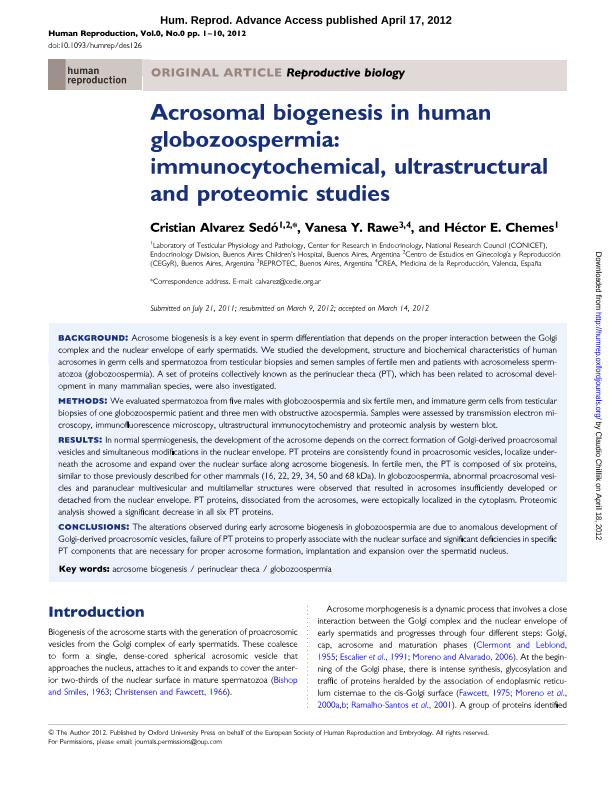Artículo
Acrosomal biogenesis in human globozoospermia: Immunocytochemical, ultrastructural and proteomic studies
Fecha de publicación:
06/2012
Editorial:
Oxford University Press
Revista:
Human Reproduction
ISSN:
0268-1161
Idioma:
Inglés
Tipo de recurso:
Artículo publicado
Clasificación temática:
Resumen
Background Acrosome biogenesis is a key event in sperm differentiation that depends on the proper interaction between the Golgi complex and the nuclear envelope of early spermatids. We studied the development, structure and biochemical characteristics of human acrosomes in germ cells and spermatozoa from testicular biopsies and semen samples of fertile men and patients with acrosomeless spermatozoa (globozoospermia). A set of proteins collectively known as the perinuclear theca (PT), which has been related to acrosomal development in many mammalian species, were also investigated. Methods We evaluated spermatozoa from five males with globozoospermia and six fertile men, and immature germ cells from testicular biopsies of one globozoospermic patient and three men with obstructive azoospermia. Samples were assessed by transmission electron microscopy, immunofluorescence microscopy, ultrastructural immunocytochemistry and proteomic analysis by western blot. Results In normal spermiogenesis, the development of the acrosome depends on the correct formation of Golgi-derived proacrosomal vesicles and simultaneous modifications in the nuclear envelope. PT proteins are consistently found in proacrosomic vesicles, localize underneath the acrosome and expand over the nuclear surface along acrosome biogenesis. In fertile men, the PT is composed of six proteins, similar to those previously described for other mammals (16, 22, 29, 34, 50 and 68 kDa). In globozoospermia, abnormal proacrosomal vesicles and paranuclear multivesicular and multilamellar structures were observed that resulted in acrosomes insufficiently developed or detached from the nuclear envelope. PT proteins, dissociated from the acrosomes, were ectopically localized in the cytoplasm. Proteomic analysis showed a significant decrease in all six PT proteins. Conclusions The alterations observed during early acrosome biogenesis in globozoospermia are due to anomalous development of Golgi-derived proacrosomic vesicles, failure of PT proteins to properly associate with the nuclear surface and significant deficiencies in specific PT components that are necessary for proper acrosome formation, implantation and expansion over the spermatid nucleus.
Palabras clave:
Acrosome Biogenesis
,
Globozoospermia
,
Perinuclear Theca
Archivos asociados
Licencia
Identificadores
Colecciones
Articulos(CEDIE)
Articulos de CENTRO DE INVESTIGACIONES ENDOCRINOLOGICAS "DR. CESAR BERGADA"
Articulos de CENTRO DE INVESTIGACIONES ENDOCRINOLOGICAS "DR. CESAR BERGADA"
Citación
Alvarez Sedó, Cristian; Rawe, Vanesa Yanina; Chemes, Hector Edgardo; Acrosomal biogenesis in human globozoospermia: Immunocytochemical, ultrastructural and proteomic studies; Oxford University Press; Human Reproduction; 27; 7; 6-2012; 1912-1921
Compartir
Altmétricas




